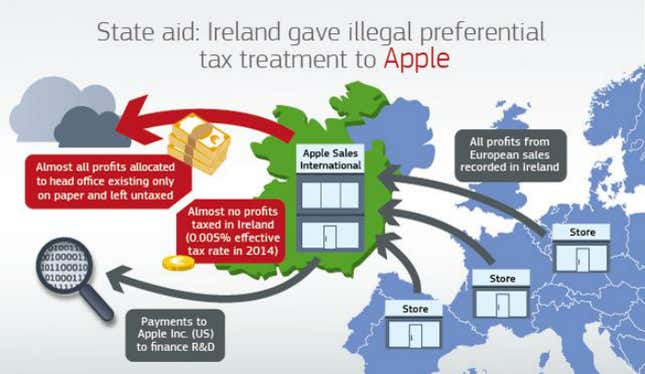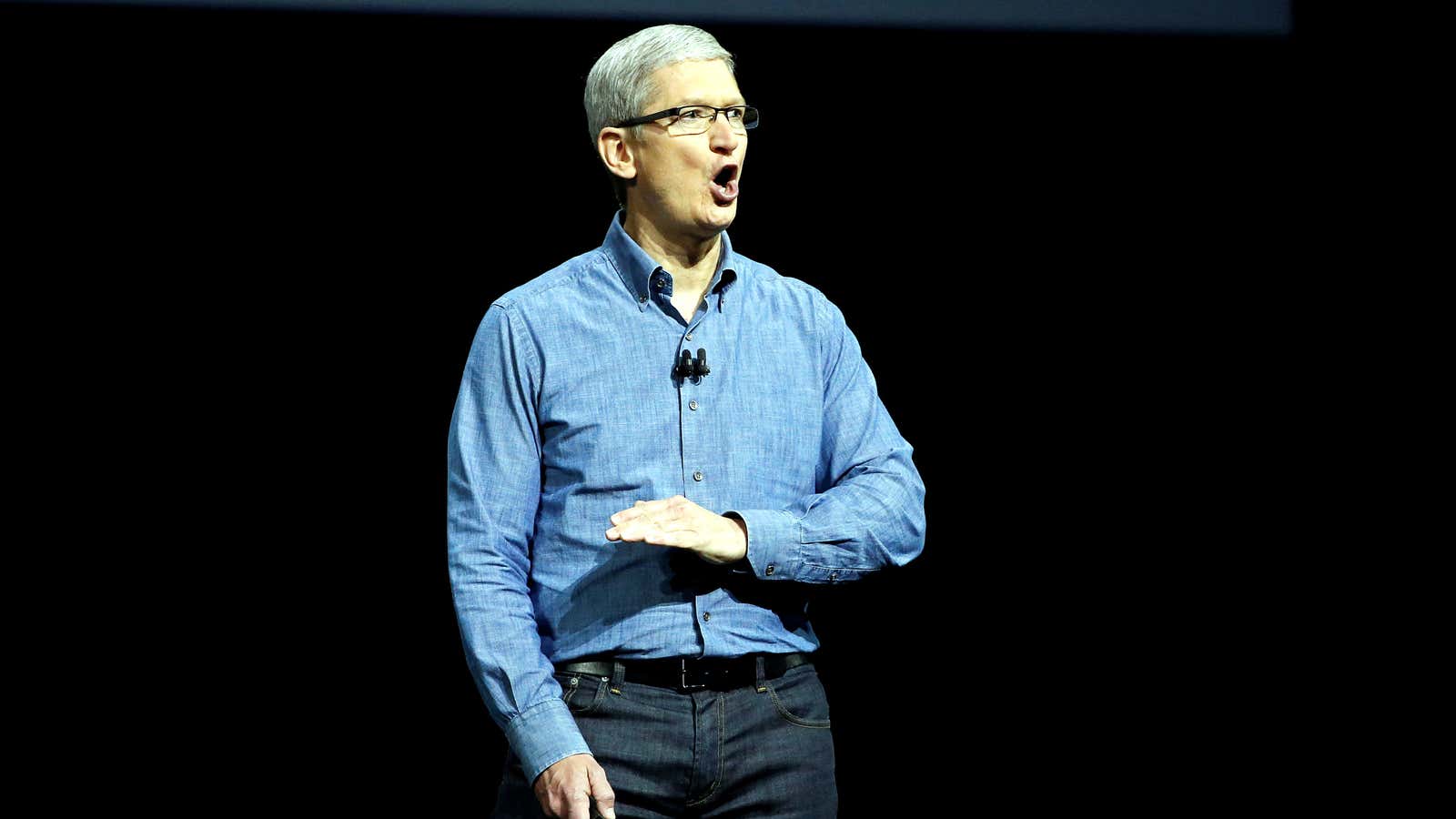Years of funneling earnings through shell companies in Ireland have finally caught up with Apple. Today (Aug. 30), the European Commission announced, after a two-year investigation, that the tech giant must pay back more than €13 billion ($14.5 billion) in “illegal tax benefits” to Ireland, plus interest.
Apple has reacted with outrage, saying the decision would “upend the international tax system” and promising to appeal and overturn the decision. No doubt years of legal fees lie ahead for all involved.
But the writing has been on the wall for Apple’s convoluted corporate structure in Ireland for years.
In 2013, a US Senate committee found that Apple pushed its foreign profits into a “stateless” company, one that paid no taxes anywhere, while using an intellectual property agreement to shift US profits to the subsidiary. In 2015, the EU released its own investigation, with more specificity: Apple had negotiated two special deals with Ireland that allowed it to allocate profits to this untaxed company.
Today’s announcement confirms that finding: “The tax rulings issued by Ireland endorsed an artificial internal allocation of profits within Apple Sales International and Apple Operations Europe, which has no factual or economic justification.” In a cartoon infographic, the commission helpfully illustrated this with wads of euros flying out of Ireland into indistinct gray clouds offshore.

Membership in the EU’s common market comes with promises that countries won’t offer special subsidies to companies and start a race-to-the-bottom in hopes of attracting corporate investment. Bespoke arrangements that avoid billions in taxes for favored firms are considered illegal state aid under those rules.
Apple CEO Tim Cook defended his company in a public letter. He noted the 6,000 employees Apple has in Ireland but did not mention that the subsidiary under investigation had neither employees nor an office, according to investigators.
“The opinion issued on August 30th alleges that Ireland gave Apple a special deal on our taxes,” Cook wrote. “This claim has no basis in fact or in law.”
But the commission noted that Apple made two individual tax agreements with Ireland. True, these are commonplace for big businesses with complex tax situations that want get a measure of certainty from governments. What makes Apple’s deals different—and problematic in the view of the EU—is that the company didn’t meet common legal or economic standards used to justify such rulings. This is a common problem in tax havens, and Apple made a similar deal in Luxembourg that was leaked in 2014.
In one example from Ireland, the commission’s report described meetings between Apple’s tax advisers and Ireland’s government where Apple’s advisers admitted there was “no scientific basis for [Apple’s desired tax payments]… however the figure was of such magnitude that he hoped it would be seen to be a bona-fide proposal.”
Cook also tried to shift the discussion away from whether Apple is paying its fair share of taxes, to who is collecting them. ”At its root, the Commission’s case is not about how much Apple pays in taxes,” Cook wrote. “It is about which government collects the money.”
Cook is fundamentally wrong about this: Because his company has been pushing so much money into a stateless subsidiary, the choice at hand is between whether Apple pays any taxes to anyone, or if that money just keeps accumulating in untouchable offshore bank accounts. Should a multi-billion dollar global company use special rulings to pay less tax than a middle-class family? (Apple’s effective corporate tax rate on its European profits was 0.005% in 2014, according to the commission.)
But Cook is right that national governments are preparing to battle over how multinationals’ tax revenues are allocated and collected. The US Treasury fired a warning shot last week with a white paper (pdf) arguing that the kind of retroactive recoveries proposed by the EU today are inappropriate. Foreign taxes paid by US companies are deductible at home (one reason to be suspicious when multinationals talk about double taxation) and Apple’s bill to the EU could mean, ironically, it pays even less tax in the US in the near future.
Many of the largest multinational US tech firms in Europe have used tax-planning strategies like this, so similar demands for retroactive payments could affect US revenue in a major way.
The US argues that these piecemeal individual penalties will hurt global efforts to prevent companies from exploiting gaps in international law to funnel money into financial black holes, as Apple has done; these efforts require cooperation, not competition. The fear is that this will undermine the certainty that businesses need to operate and invest around the world.
At least one thing’s for certain: Any multinational caught shifting their earnings into a stateless shell company to avoid taxes is going to wind up in a world of trouble.
